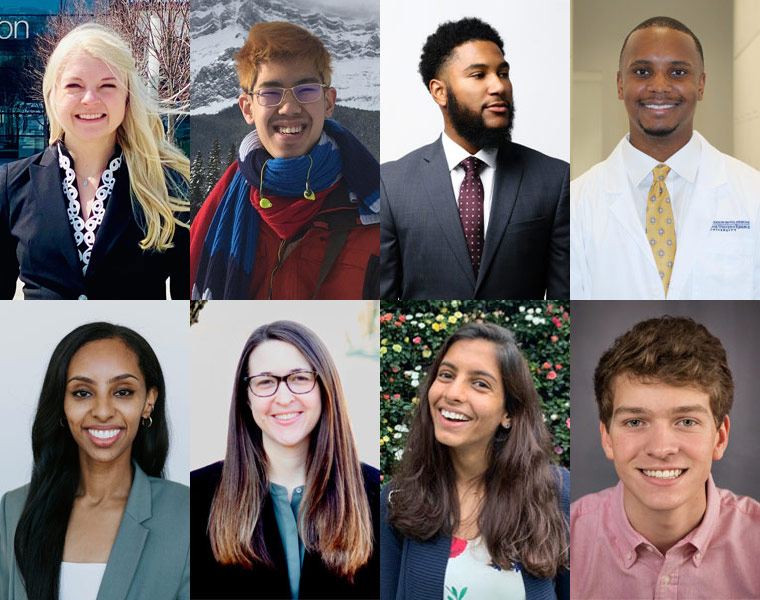Faced with the many challenges associated with the COVID-19 pandemic, students in the Class of 2021 have demonstrated tenacity in their studies, research and on- and off-campus activities.
To mark the completion of their degrees, Case Western Reserve University will host commencement ceremonies across several days, beginning with the School of Law and School of Medicine this weekend. While only graduates will be able to attend in-person events, members of the community can tune into livestreamed ceremonies. Get the full details.
Here, we’re highlighting the accomplishments of eight of our many outstanding graduates.
Megan Alder
Frances Payne Bolton School of Nursing
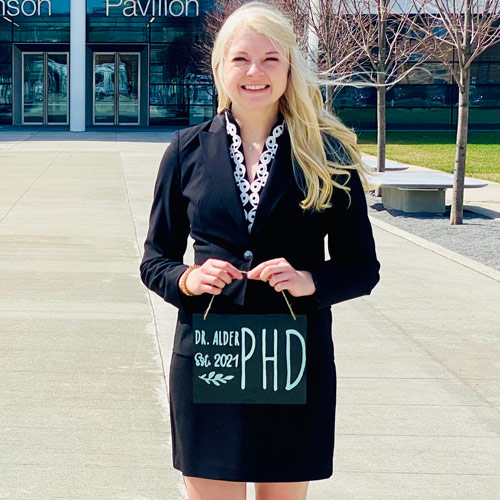
In July, 2021 nursing PhD graduate Megan Alder is moving to Atlanta for a two-year postdoctoral fellowship at Emory University working at Marcus Autism Center, one of the country’s largest autism research centers and a National Institutes of Health Autism Center of Excellence.
The position was created for Alder, who will be the only nurse on her research team.
“I’ll be looking at how sleep relates to feeding issues in young children with autism spectrum disorder (ASD),” she said. “There are so many topics to explore with this area of ASD research—physical activity, behavioral sleep treatments, environmental elements—it’s a holistic approach.”
The move takes Alder closer to home in Tennessee. She earned her undergraduate degree at Lipscomb University and conducted research at Vanderbilt University, both in Nashville, before moving to Cleveland.
“I was working with my mentor at Vanderbilt, Dr. Beth Malow, and she inspired me to pursue a PhD at Case Western Reserve University in clinical research for sleep problems in children with ASD,” Alder said. “There is a big need for research in the field. Eighty percent of children with ASD experience disrupted sleep.”
Alder said established autism centers and clinical research opportunities drew her to Case Western Reserve’s Frances Payne Bolton School of Nursing. While in Cleveland, she worked as a pediatric registered nurse at Bellefaire JCB’s Monarch Center for Autism in Shaker Heights, a school and residential treatment center for youths to adults with ASD.
In March, Alder received an honorable mention at Midwest Nursing Research Society’s annual conference for her research on sleep disturbance and challenging behaviors in children with ASD and caregiver stress.
“I was interested in this population originally because I have Type 1 diabetes, and I wanted to advocate for vulnerable populations that have not received much research attention in significant areas,” she said. “Nurses play an important role because we’re looking at not only our patient’s health but the family as a unit.”
Alder held leadership positions in the PhD Students Nursing Association, and said the organization helped enhance professional development and leadership skills.
“We have a say of where the PhD program is going, and a voice on the PhD planning committee,” she said. “Our voices are heard and they do modify the program based on student feedback.”
Benjamin Cheung
College of Arts and Sciences
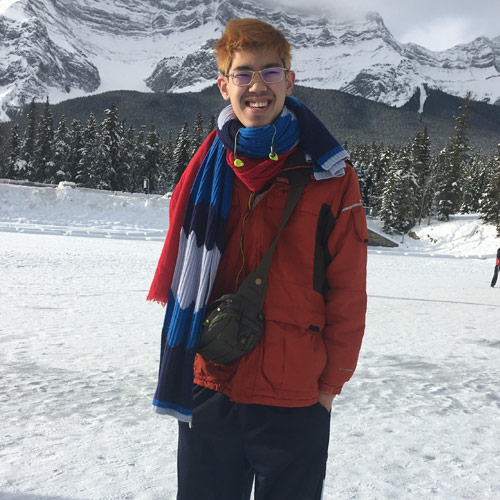
Despite standing 6 feet, 4 inches tall, Benjamin (Benny) Cheung is often described as “flying under the radar.” However, Cheung’s impeccable grades, straight As in all courses, double major in math-physics and music, and involvement in extracurriculars say otherwise.
A self-taught composer and origamist, Cheung learned both talents with the help of a few books and several YouTube videos. Years ago, he discovered the craft of origami, and now, as the president of the Case Western Reserve University (CWRU) Origami Club, he says working with his hands also helps him stay focused when he’s working on a challenging equation. As an added benefit, the paper folding also relates to math and helps him visualize things in 3D for physics.
Cheung has been creating beautiful things with his hands since he was young. At the age of 7, he started playing the piano, performing in recitals and competitions through high school. When he was deciding which college to attend, he knew that he was looking for a university with both a challenging physics program and a strong music community, leading him to CWRU. His original plan was to take a few music theory classes, but when he arrived at orientation, he decided to take the placement test and declared music as a second major.
When he is at home in Seattle, Washington, Cheung’s piano sits beside his laptop, giving him the opportunity to practice and compose with ease as he explores a variety of music genres from classical to modern to jazz.
“He is a creative musician,” Eric Charnofsky, instructor in the Department of Music said. “Both as a pianist, learning unusual repertoire, it seems that nothing is too challenging for him, and as a composer.”
While music will remain important to Cheung, upon graduation he will continue his physics education, pursuing a PhD in applied physics at Rice University. He hopes to eventually work in industry or government and credits a large part of his professional growth to the CWRU Department of Physics.
Ivan Conard
Jack, Joseph and Morton Mandel School of Applied Social Sciences
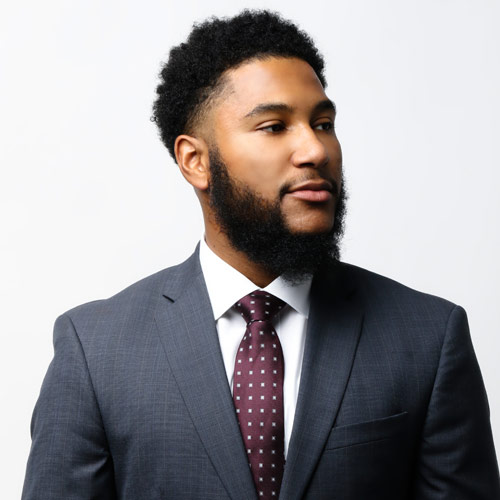
Ivan Conard has a personal philosophy: How do I empower communities while dismantling historical and systemic barriers?
During the two years between earning his undergraduate degree in psychology at Morehouse College and enrolling at the Jack, Joseph and Morton Mandel School of Applied Social Sciences, Conard determined he wanted to expand his role in the community and support positive organizational change.
So, he built relationships with a variety of decision makers and explored different career paths—at Quicken Loans, the Children’s Defense Fund, the Ohio Democratic Party, Youth Opportunities Unlimited, Beech Brook and United Way. But Conard soon realized that many of these nonprofit organizations are in place just to hold systems together, and that he held little power to change this. Through numerous conversations, he was introduced to the Mandel School and quickly developed an interest in social work and community practice for social change.
Conard became heavily involved at CWRU, most notably as a Trauma Center Research Scholar, where he was part of the research team that contributed to the COVID-19 pandemic mental health study and the Cleveland Neighborhood Resource trauma-informed care evaluation.
Looking to find ways to better advocate and empower individuals, Conard interned at the School of Law’s Milton A. Kramer Law Clinic Center, and became president of the Black Student Association’s Mandel School chapter, a First-Year Assistant Residential Community Director and the NASW Ohio Chapter’s MSW Student Representative. In 2019, he was named a Northeast Ohio Top 25 Under 35 Mover and Shaker.
These experiences, along with always observing his personal philosophy, won him the National Association of Social Workers (NASW) Ohio Chapter’s 2020 Student of the Year.
“Winning this award is humbling,” he said at the virtual celebration. “I’m appreciative, and I wouldn’t be where I am today without the support of my family, friends and mentors.”
What’s next for Conard? Above all, he wants to make sure that his journey post-graduation is intentional. He plans to practice as a licensed social worker leading trauma-informed nonprofit organizations to make high-impact change for youth, families, communities and the nation.
“Everything’s a learning experience,” he said. “I look forward to revisiting how my education in social work impacts my practice.”
Justin McCray
School of Dental Medicine
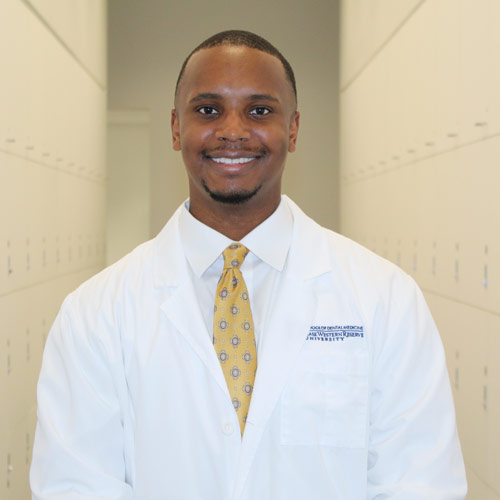
Fourth-year DMD student Justin McCray’s path to dentistry almost reads as a Google commercial script, showcasing how tenacity, and a simple internet search, can change your life.
McCray received a text from his father during his freshman year at Southwest Mississippi Community College (SMCC), prompting him to explore career possibilities and find his passion. That message set off an internet—and soul—search that led him to dentistry.
Through his research, McCray found a summer internship with the University of Mississippi School of Dentistry. He shadowed and assisted residents, experiencing firsthand what a career in dentistry would entail—with one particular instance solidifying his career path.
An Army veteran visited the dental clinic seeking treatment for a partial denture that was causing a lot of pain.
“After about four to five [adjustments], we finally got [the placement] right, and the Army veteran started crying,” said McCray. “It was the coolest thing. He got out of his chair and hugged me. From that moment, I was sold. I knew dentistry was for me.”
After that experience, McCray went back to the internet to find summer dentistry programs for undergraduates, where he came across the Summer Medical and Dental Education Program at Case Western Reserve University.
He participated in the six-week program after his second year and knew he wanted to attend Case Western Reserve School of Dental Medicine. After transferring from SMCC and graduating from the University of Mississippi, McCray moved to Cleveland for dental school.
Navigating through his final year in the DMD program, McCray researched specialty areas, eventually landing on pediatric dentistry.
While he became interested in pediatric dentistry through rotational experiences and working with mentors, becoming a basketball coach for third- and fifth-grade students in inner-city Cleveland gave him the confidence to know this was the right path.
“It gave me confidence to know that I can successfully work with young people and give them confidence—and it’s the same thing with dentistry,” said McCray. “If a young patient has that same confidence in me, together we can get through the appointment.”
Throughout his academic career, he credits his family as a huge part of his success—always encouraging to find and follow his dreams—and looks forward to celebrating his accomplishments with them. Following graduation, McCray is attending the Pediatric Dentistry Residency Program at Case Western Reserve.
Bethel Mieso
School of Medicine
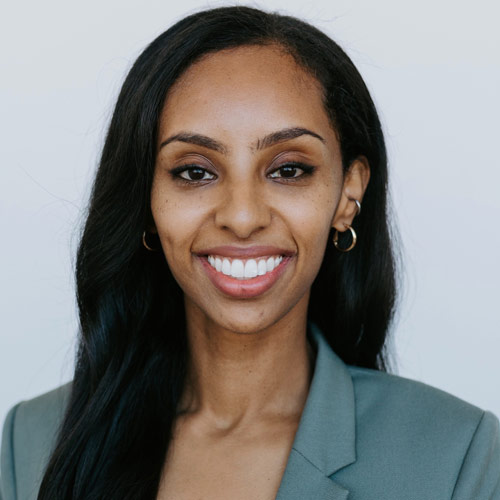
During a humanitarian trip to Ethiopia when she was 16, Bethel Mieso realized what life might have been like if her family hadn’t relocated from there to California when she was younger. Observing the country’s overwhelming health care disparities firsthand, the trip also sparked her passion to become a doctor and, one day, return to her birthplace to practice medicine.
“I came home from that trip eager to make a difference, to help care for vulnerable people there,” Mieso said.
Growing up Black in the San Francisco Bay Area, Mieso remembers looking different from most people in the community. As an undergraduate at San Jose State University, she spent a year in Alabama through a nonprofit community health fellowship—the first time she experienced living within a large Black population—and was deeply impacted by it. While looking at medical schools, she liked what she saw in Cleveland: opportunities to serve communities of color and address health inequities in partnership with community leaders.
During her early years at CWRU through the Longitudinal Patient Navigation elective, she volunteered as a patient navigator, helping coordinate care between underserved patients, primary care physicians and other providers. Impressed with her leadership, the American Medical Association invited her to lead a workshop about her experiences at their Accelerating Change in Medical Education conference in 2018.
This past year, she developed and implemented the Racism and Health elective, providing students the opportunity to explore racism’s impact on health and discuss ways in which physicians can promote racial health equity. The course was offered four times in 2020 – 2021.
“I have loved going to school here, being in Cleveland and volunteering,” she said. “I’m going to miss it.”
Still, she’s excited by what’s next: a residency in pediatrics at Lucile Packard Children’s Hospital at Stanford University.
“Children bring me so much joy,” Mieso said. “I want to care for kids and help empower them—which is what I hope to be doing for the next three years and beyond.”
Mieso’s eventual goal is to address health inequities through patient care and public health as a pediatrician in the U.S. Additionally, she hopes to return to Ethiopia one day to promote sustainable health care systems for its citizens.
Blair Mills
School of Law
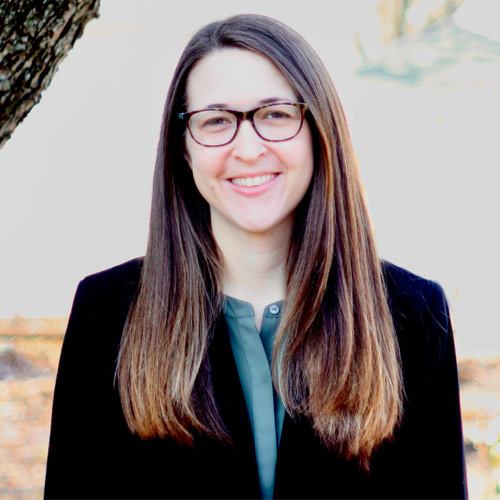
It makes sense that Blair Mills will be helping others after she graduates. It’s why the then-social worker originally chose to attend Case Western Reserve University School of Law: She saw clients “repeatedly facing barriers created by legal issues” and wanted to help.
Now just days from receiving her JD degree, Mills is looking forward to her next chapter—working with Equal Justice Works in Eastern Missouri. There, she will provide family law representation for survivors of domestic violence in high poverty areas of St. Louis.
“Survivors of color and survivors living in poverty face a higher risk of abuse and additional barriers when trying to leave an abusive relationship,” Mills explained.
Her two-year project, developed alongside Legal Services of Eastern Missouri, seeks to break down some of those barriers.
“My project will begin to address the gap in services in the St. Louis area,” said Mills. The work will include providing representation for survivors living in high-poverty areas, creating pro se family law clinics to increase the reach of services, and collaborating with community agencies “to ensure we are connecting with those most in need of services.”
Mills already had the opportunity to work with Legal Services of Eastern Missouri, and several other nonprofit organizations, during her time in law school.
“One of the aspects of the CWRU School of Law I most enjoyed was the focus on experiential education,” she shared. “There are many opportunities both in the classroom and through externships to get hands-on experience.”
These real-world experiences allowed Mills to “get a sense of what a career in public interest law would be like” and to connect with lawyers doing work she was interested in pursuing. Eventually, her hard work paid off.
“I feel so grateful to be able to do this work after graduation,” she said. “This project is truly my dream job.”
Devika “Ria” Nandwana
Case School of Engineering
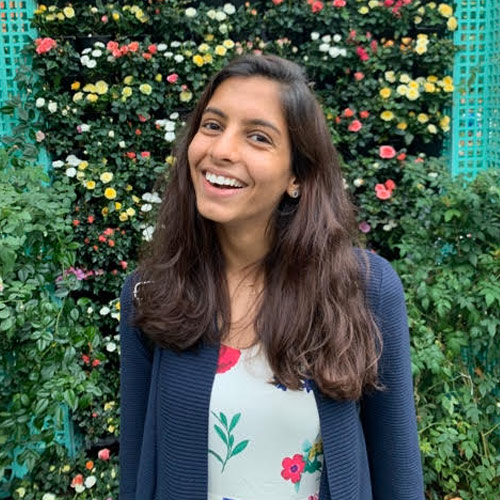
Devika “Ria” Nandwana caught the engineering bug at a young age, taking apart household items to learn how they worked. Sometimes she had to ask her father, an engineer, for help putting the pieces back together.
“I think I ended up breaking more things than fixing them,” she said.
That curiosity has served her well. In May, Nandwana will graduate from Case School of Engineering with a bachelor’s degree in materials science and engineering. In July, she will begin the MD program at the university’s School of Medicine.
Nandwana is no stranger to working in health care settings. During her second and third years, she shadowed physicians at University Hospitals and discovered an interest in orthopedic surgery.
Nandwana received Emergency Medical Technician (EMT) certification as a first-year student and has served EMT shifts on campus ever since. This semester, she has administered vaccines and provided other volunteer services at COVID-19 vaccination clinics, including the CWRU site.
Engaging with the community
Over the past four years, Nandwana has been actively involved in CWRU’s Center for Civic Engagement & Learning (CCEL), an organization that opened her eyes to the needs of the underserved in Cleveland. As a CCEL Engagement Scholar, she learned how to actively listen before offering assistance to those in need.
“It’s important to understand how people want to be helped. Only then can you serve with more sensitivity,” she said.
Nandwana’s own experiences as an immigrant from India and woman of color have fueled her passion for social justice and for working to ensure a more diverse and inclusive community on campus. As a first-year student, she joined the Undergraduate Materials Society’s board as the only female and person of color and began recruiting a more diverse group of students to represent the society, which provides support to students in the Department of Materials Science and Engineering.
It’s for this type of commitment to excellence that Nandwana received the Robert L. Shurter Prize earlier this year. The prize is awarded to a senior for leadership in extracurricular activities in the Case School of Engineering.
Nandwana has been overwhelmed by the inclusiveness and sense of community at CWRU.
“It’s a really healthy environment here. People work together and value cooperation and diversity.”
Bradley Schneider
Weatherhead School of Management/College of Arts and Sciences
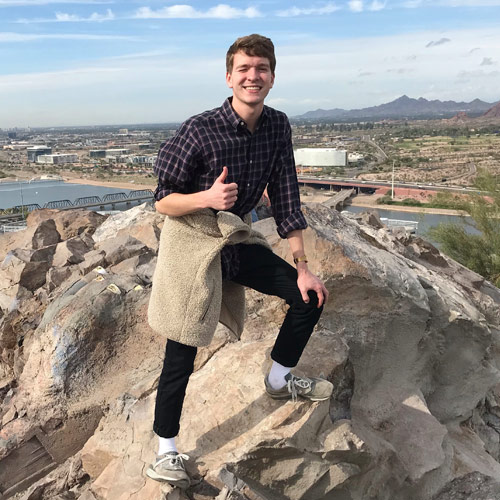
For Bradley Schneider, it’s always been about perspective.
When searching for colleges, he knew what he wanted: a dual degree in theater and business management. Case Western Reserve was the only university he considered that offered that option, and it didn’t hurt that he loved the campus when he visited.
“I’ve never seen a building like the Peter B. Lewis Building before. I mean, I’ve seen the Walt Disney Concert Hall, but I don’t expect to take an economics class there,” he added jokingly, referencing the Los Angeles venue also designed by Frank Gehry.
Originally from Greenville, South Carolina, Schneider said that his hometown lacks the sense of diversity he was seeking.
“It has never ceased to amaze me how I would meet somebody new who can completely change my perspective,” Schneider said. “My eyes were opened. It’s humbling and forces you to look outside of yourself.”
With 150 credit hours under his belt as a dual major, Schneider said the experience, however challenging, was equally rewarding.
Switching from the left brain to the right as a theater and business dual major may sound difficult, but Schneider saw it as a “break” between the two seemingly different perspectives.
“I could go to a theater class and work on acting and be impulsive and creative, and then take a break from that and go to Weatherhead School to think about numbers and analytical work,” Schneider explained.
Schneider said there is some surprising overlap between the two majors, stating that much of what he learned in his theater major—such as creativity and empathy—could be leveraged in his business degree and even applied during his four business internships.
Schneider credits the applicability of the course content in both majors to his success during his strategy internship with Ford last summer that led to a job offer from the company, where he’ll begin full time in August.
Looking back on his time as an undergraduate, Schneider said he’s thankful for the connections he made with faculty, the friendships formed with classmates, and the opportunity to expand his perspectives while on campus.
“The culture, the passion and the competition are really what has made me fall in love with Case Western Reserve, Weatherhead and the city of Cleveland,” he said.


